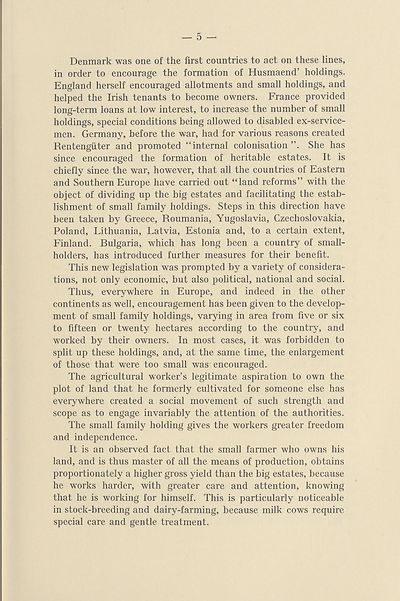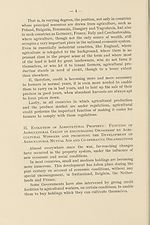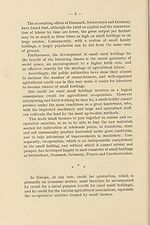Download files
Complete book:
Individual page:
Thumbnail gallery: Grid view | List view

— 5 —
Denmark was one of the first countries to act on these lines,
in order to encourage the formation of Husmaend’ holdings.
England herself encouraged allotments and small holdings, and
helped the Irish tenants to become owners. France provided
long-term loans at low interest, to increase the number of small
holdings, special conditions being allowed to disabled ex-service¬
men. Germany, before the war, had for various reasons created
Rentengiiter and promoted “internal colonisation”. She has
since encouraged the formation of heritable estates. It is
chiefly since the war, however, that all the countries of Eastern
and Southern Europe have carried out “land reforms” with the
object of dividing up the big estates and facilitating the estab¬
lishment of small family holdings. Steps in this direction have
been taken by Greece, Roumania, Yugoslavia, Czechoslovakia,
Poland, Lithuania, Latvia, Estonia and, to a certain extent,
Finland. Rulgaria, which has long been a country of small¬
holders, has introduced further measures for their benefit.
This new legislation was prompted by a variety of considera¬
tions, not only economic, but also political, national and social.
Thus, everywhere in Europe, and indeed in the other
continents as well, encouragement has been given to the develop¬
ment of small family holdings, varying in area from five or six
to fifteen or twenty hectares according to the country, and
worked by their owners. In most cases, it was forbidden to
split up these holdings, and, at the same time, the enlargement
of those that were too small was encouraged.
The agricultural worker’s legitimate aspiration to own the
plot of land that he formerly cultivated for someone else has
everywhere created a social movement of such strength and
scope as to engage invariably the attention of the authorities.
The small family holding gives the workers greater freedom
and independence.
It is an observed fact that the small farmer who owns his
land, and is thus master of all the means of production, obtains
proportionately a higher gross yield than the big estates, because
he works harder, with greater care and attention, knowing
that he is working for himself. This is particularly noticeable
in stock-breeding and dairy-farming, because milk cows require
special care and gentle treatment.
Denmark was one of the first countries to act on these lines,
in order to encourage the formation of Husmaend’ holdings.
England herself encouraged allotments and small holdings, and
helped the Irish tenants to become owners. France provided
long-term loans at low interest, to increase the number of small
holdings, special conditions being allowed to disabled ex-service¬
men. Germany, before the war, had for various reasons created
Rentengiiter and promoted “internal colonisation”. She has
since encouraged the formation of heritable estates. It is
chiefly since the war, however, that all the countries of Eastern
and Southern Europe have carried out “land reforms” with the
object of dividing up the big estates and facilitating the estab¬
lishment of small family holdings. Steps in this direction have
been taken by Greece, Roumania, Yugoslavia, Czechoslovakia,
Poland, Lithuania, Latvia, Estonia and, to a certain extent,
Finland. Rulgaria, which has long been a country of small¬
holders, has introduced further measures for their benefit.
This new legislation was prompted by a variety of considera¬
tions, not only economic, but also political, national and social.
Thus, everywhere in Europe, and indeed in the other
continents as well, encouragement has been given to the develop¬
ment of small family holdings, varying in area from five or six
to fifteen or twenty hectares according to the country, and
worked by their owners. In most cases, it was forbidden to
split up these holdings, and, at the same time, the enlargement
of those that were too small was encouraged.
The agricultural worker’s legitimate aspiration to own the
plot of land that he formerly cultivated for someone else has
everywhere created a social movement of such strength and
scope as to engage invariably the attention of the authorities.
The small family holding gives the workers greater freedom
and independence.
It is an observed fact that the small farmer who owns his
land, and is thus master of all the means of production, obtains
proportionately a higher gross yield than the big estates, because
he works harder, with greater care and attention, knowing
that he is working for himself. This is particularly noticeable
in stock-breeding and dairy-farming, because milk cows require
special care and gentle treatment.
Set display mode to:
![]() Universal Viewer |
Universal Viewer | ![]() Mirador |
Large image | Transcription
Mirador |
Large image | Transcription
Images and transcriptions on this page, including medium image downloads, may be used under the Creative Commons Attribution 4.0 International Licence unless otherwise stated. ![]()
| League of Nations > Economic and financial section > Report on systems of Agricultural credit and insurance > (15) |
|---|
| Permanent URL | https://digital.nls.uk/190543429 |
|---|
| Shelfmark | LN.II |
|---|
| Description | Over 1,200 documents from the non-political organs of the League of Nations that dealt with health, disarmament, economic and financial matters for the duration of the League (1919-1945). Also online are statistical bulletins, essential facts, and an overview of the League by the first Secretary General, Sir Eric Drummond. These items are part of the Official Publications collection at the National Library of Scotland. |
|---|---|
| Additional NLS resources: |
|

